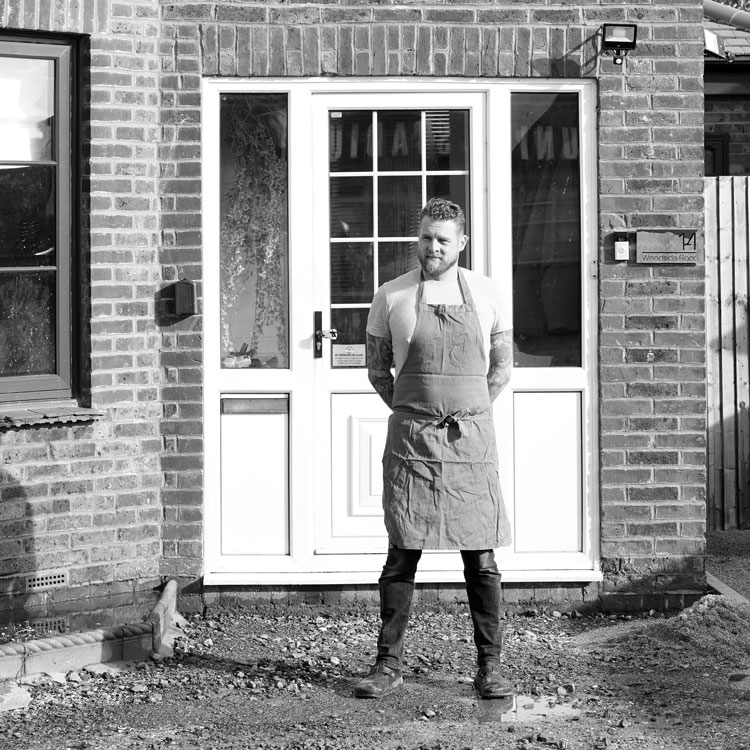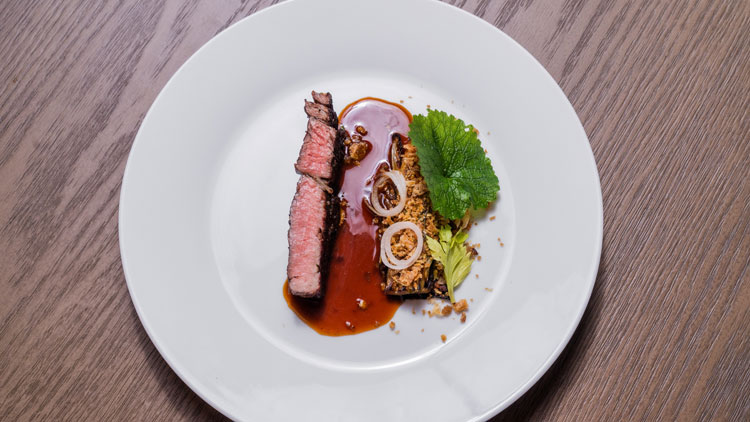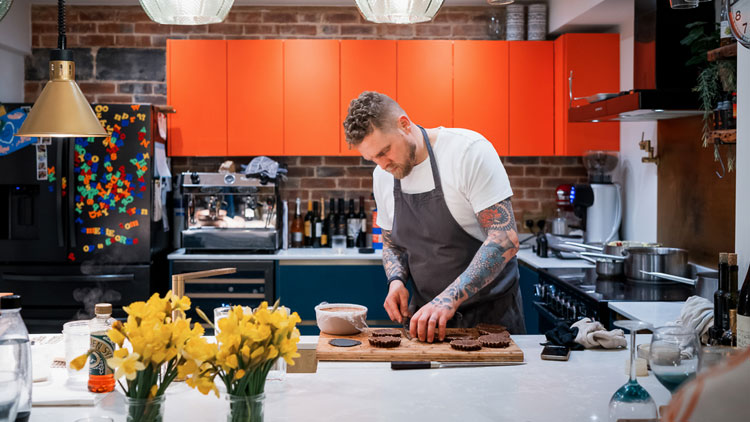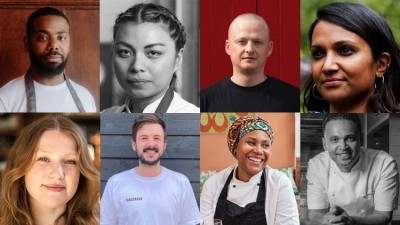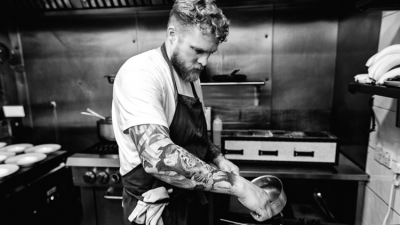Meet the chef setting up a top-flight dining experience within his house
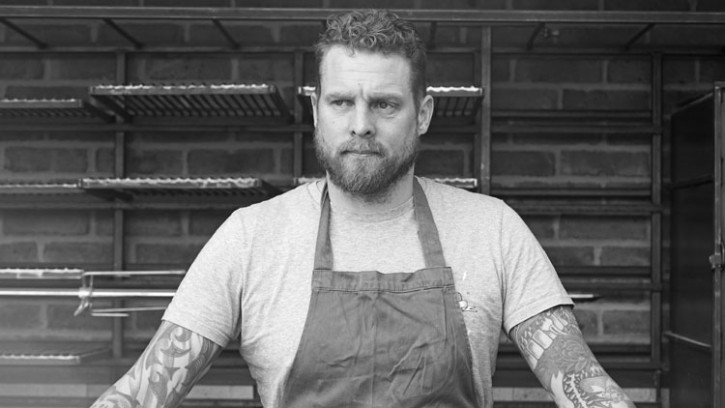
A Pacojet whirring away in the corner? Check. Produce-led dishes cooked over fire on a custom-made grill? Check. A bearded chef with sleeve tats? Check. So far, a typical ambitious restaurant launch in 2023.
But we’re not in a restaurant, we’re in a semi-detached family home in the West Sussex town of Worthing. Opened last month by former Fera at Claridge’s and Smoking Goat chef Aaron Dalton, Four seats a maximum of 22 covers and offers a £120 tasting menu of around seven courses. It is currently only open once every other week, but Dalton plans to gradually extend his opening hours as the project beds in and word gets out.
People charging others money to eat in their home is not without precedent. There are restaurants that started out as supper clubs, for example, and more permanent places also exist, albeit largely under the radar. Yet what Dalton is doing sits in a different category. It may be within his home, but Four has the requisite equipment and layout to deliver an undiluted high-end restaurant experience and represents an investment of £120,000. It also has its own website.
This most unusual of projects is born out of tragedy. Dalton’s wife Sally – with whom he ran a largely Brighton-based pop-up that was also called Four - died at the end of last year following a battle with cancer. The pair had planned to open a restaurant, but with two young kids to look after – one is at nursery and one recently started school - this is no longer an option for Dalton.
“This is the only way I can do it. The bottom line is that I need to be here for them all the time,” says Dalton of his unconventional approach to running a restaurant. “I can’t be working away from home until late every night.
“I also don’t want the financial stress that would come from having a conventional restaurant.”
Home is where the heart is
14 Woodside Road is a family home first and a hospitality venture second. Guests enter through a side gate that leads into the garden rather than Dalton’s front door so they walk past his impressive outdoor grilling setup, which features a large multi-level grill and a wood-fired oven. “I like that because I want people to know that I am serious. That I haven’t just done all this on a whim.”
The large extension that houses Four is accessed via a patio door. On first inspection, the space doesn’t really look like a restaurant, although there are some clues including three trestle tables stacked neatly against the wall, an enormous collection of chef cookbooks and a kitchen with what looks like an oversized breakfast bar but is, in fact, a pass.
Above the high-ceilinged area that doubles as Four’s dining room is a den accessed via a ladder with a TV and PlayStation. “I set it up like this so the kids can have their own space but can still talk to me while I’m prepping,” says Dalton, who as well as being a skilled chef is handy in the extreme – some specialist help with plumbing and electrics aside, he built the space that houses Four on his own.
“I don’t want the financial stress that
would come from having a
conventional restaurant”
Pictures of his wife and children and other family members are dotted around and – just across from the pass – is a small picture frame emblazoned with the words ‘don’t be a dick’, one of Sally’s final pieces of advice to her husband.
Dalton’s kitchen could pass for a fully-domestic one were it not for the hot lights that hang over Four’s pass. Other things within it that you would not usually see in a home kitchen include a large, high-end coffee machine with two groupheads, an equally fancy-looking bean grinder, a copper water pipe positioned over the stove to allow easy filling of stockpots and a magnetic rack that holds some very serious looking knives.
Dalton’s induction range cooker is high-spec but intended for domestic rather than professional use. “This is a family home first and foremost,” he explains. “Ovens and stoves designed for commercial use don’t have any safeguards to protect little hands. They are designed to be used by professionals who know what they are doing.”
Going fully-electric means Four does not require heavy-duty extraction, which would have had significant cost, planning and noise implications. “It will also partly insulate me from energy price rises. I eventually want to install solar panels on the roof,” Dalton continues. “There will be a big saving if I can largely take this place off the grid.”
Off to the side of Four dining area is a more industrial looking prep kitchen and washing up area that doubles as the house’s utility room that is packed with commercial kit including a three-door counter fridge, a chamber vacuum sealer and a small Rational combi oven. Eventually, Dalton plans to rejig the design to allow it to function just like a restaurant wash-up area, with the washing of the plates and cutlery happening completely out of view of his guests.
Freeform cookery
Largely just listing ingredient combinations – for example potato, truffle, heart – Four’s menu does not give much away. Dalton describes his cooking style as free-form. “It’s whatever I feel like doing. I want to surprise people. I remember having a celeriac, Muscat grape and hazelnut dish at Dabbous and just thinking ‘this is a piss take, how can this be so good?’. It was just so clever. I want to try and deliver that.”
Most of the key ingredients will be cooked over fire at some point. “I enjoy working with fire. I like the fact that it is untameable but that you can try and coerce it into a certain direction.”
Dalton believes that Four being within his own home and having a ticketed business model means that he is less constrained than regular restaurants when it comes to writing his menus. “I’m in my own space, I can serve what I want. One night I might do something quite structured, like an English take on kaiseki cooking and really show off. But the next night I might offer a more casual (and lower priced) Thai or Mexican night. But I do have a determination to offer high-end food for much of the time. Four will operate at the highest level I can possibly deliver.”
Dalton has been working in restaurants on and off since secondary school. Academic education had been a struggle due to his severe dyslexia so – not really knowing what else to do – he started working in kitchens. He spent his late teens and early 20s working in unremarkable places in and around Brighton knocking out basic food, most often pizza and pasta.
During this period cooking was a means to an end rather than a long-term career option. Dalton had his sights set on being a semi-professional snowboarder and spent summers on the south coast and winters in the Alps. Mid way through his 20s he took a job cooking at the Sofitel hotel in Gatwick Airport, which was overseen by chef David Woods at the time.
“He beasted me to the point where I became a good chef. He weeded out all the bad habits I had picked up working in lesser places. It was a long six months but it did me a lot of good.”
Around this time, he meet Sally. Encouraged by her father – who had trained at The Savoy – Dalton started to take his cooking more seriously. He worked at Chez Bruce in Wandsworth under Bruce Poole and Matt Christmas and did stages at restaurants including Marcus Wareing at the Berkeley and Dabbous. Problems with drugs and alcohol saw Dalton (who is now teetotal) split up with Sally.
"Four will operate at the highest
level I can possibly deliver"
A stint cooking all over the world for high-end events company Eat to the Beat followed. Now clean and sober, Dalton reunited with Sally and the pair tied the knot. He then spent a year or so on the fish section at Fera at Claridge’s before taking a head chef job at Smoking Goat (which was then in Soho).
In 2015, Dalton left Smoking Goat and returned to the south coast to launch Four as a pop-up series with Sally working front of house and overseeing the admin side of things. He also sought employment in other people’s kitchens, but was so disillusioned with the pay on offer outside the capital ended up retraining as a carpenter.
Just ahead of the pandemic, the couple lined up a tiny restaurant site on central Brighton’s Vine Street but their backer pulled out at the last minute. It turned out to be a blessing in disguise. “Covid would have killed us. We would have had no support from the Government. It would have gone tits up and we would have lost all of our capital.”
Shortly after lockdown, Sally was diagnosed with terminal cancer. While the two or so years that followed sound bleak – Sally’s father passed away a few months before his daughter – Dalton sees this period as a blessing. “The world stopped. We were all able to spend time together as a family. We were all foodies. We sat around making food and getting fat.”
A grey area
Dalton is the first to recognise that he is operating within a grey area with Four. He is yet to take any legal advice but he has talked the project through with peers and seems confident that Four is viable.
“Lots of chef do private dinners at other people’s houses and that is okay,” he points out. “I can’t see the issue, really. I’ll be getting the kitchen signed off by the EHO and I will follow all of the health and safety processes that I would in a normal restaurant.”
Taking alcohol out of the equation makes things more straightforward as he won’t need an alcohol licence, but it also removes a key profit stream. But there are a few question marks. Occasional supper clubs are one thing, but Dalton has installed professional cooking equipment and is employing people to help him run it (albeit on a freelance basis). He will also soon put up an illuminated sign outside his house. Possible pitfalls include – but are not limited to – problems with insurance, refuse collection and planning regulations.
It is the latter that should probably be Dalton's biggest worry. It’s difficult to get a straight answer from experts about whether a project like Four is okay from a planning perspective. Typically, planning is not required when part of a home is used for business purposes. However, planning permission may be required if the business leads to a marked rise in traffic or people calling; when a business disturbs neighbours at unreasonable hours or causes other nuisance; and - the big one - the business ‘involves any activities considered unusual in a residential area’. Clearly, all three of these points could be argued either way.
He may also – eventually – be required to pay business rates which, on top of a mortgage, would potentially be ruinous for Four. “The problem is, I’m solely reliant on the food to make my margin. This, as everyone in the business will know, is very tough as restaurants tend to make most of their margin on alcohol sales.”
It is possible that Four could eventually secure an alcohol licence (see boxout, below) and Dalton could also sell alcohol by means of a TEN (Temporary Events Notice) but only a limited number of times per year. “I’m looking into it, but it’s not something I can do right now. I’m feeling my way through it,” he says.
What about the other people that live on the street? Dalton’s immediate neighbours know what is happening and are – for the moment, at least – supportive (it helps that he has thoroughly sound proofed the space). But when that sign goes up one suspect there’s going to be a lot of chatter on the local WhatsApp group. Four has yet to be covered in the local news, but presumably will be soon.
“I have no idea how people will react to it. I just know that I am going to do it and that I’ll figure it out as I go,” Dalton says matter-of-factly.
“This project isn’t about money. It’s about
staying creative and showing my
kids that even after tragedy life goes on"
It’s risky but – as Dalton points out – it would also be risky to open a conventional restaurant and would have also required far more capital investment. “The industry is fucked. It should have been dismantled after Covid and rebuilt in a way that is more sustainable for both owners and employees. People are running their arses off trying to survive. I don’t want that.”
Four initially only opening every other weekend is not down to the limitations of it being within his home, rather Dalton doesn’t think he will have the traction to reliably fill it. Eventually, the chef will look to do two evening services per week on Friday and Saturday before eventually switching to Thursdays and Friday nights to keep his weekends free for his kids. If all goes well, Four will end up doing around 100 services per year.
Can Dalton really feed his family and pay his mortgage (not to mention recoup what he has spent on the build and kit) on that revenue? No. And to ask that question is to miss the point of Four. While the project will supplement the family’s income, Dalton will continue to work nearly full time on building sites for the foreseeable future.
“This project isn’t about money. It’s about staying creative and showing my kids that even after tragedy life goes on. Life does not stop when you lose your mum. It can’t. You can still have dreams.
“If I’m not willing to fight for my dreams when shit gets hard, what sort of example am I setting?”
Colour images: Xavier Buendia
Black and white images: Restaurant magazine
Thinking of opening a restaurant in your home? Here's what you need to consider
Opening a restaurant in your home might not be commonplace, but it is feasible, providing you adhere to licensing rules.
Graeme Cushion, a partner at licensing solicitors Poppleston Allen, is surprisingly upbeat about Dalton being able to obtain a premises licence for Four should he want to go down that route. “There is no automatic prohibition in place just because the business in question happens to be in someone’s home. But, in such a scenario, I would strongly suggest that the person applying smooths the way first by talking to the local licensing authority (in this case Adur & Worthing Councils), the police and their neighbours.”
Dalton is correct that operating on a BYOB-only basis circumnavigates licensing issues. “Neighbours could still call the police or contact environmental health if they are - for example - disturbed by noise,” Cushion continues. “But, as far as I know, there would not be any specific licensing offences that would be triggered, by virtue of the fact that there isn’t a licence in place.”
It could be argued that, from the neighbour’s perspective, it would actually be better if a premises licence was in place because it would give a greater degree of control and accountability. Cushion estimates the cost of obtaining a premises licence to be between £3,000 and £4,000 including professional fees and adverts in local papers (it is a requirement that the application is publicised).
Once the premises licence application is created stakeholders - most notably Dalton’s neighbours, the police and environmental health - would have 28 days to make representations. These can be positive or negative. If any negative representations are unresolved at the end of the period, the case would go before the local authority’s licensing committee.
By obtaining a premises licence (and by registering as a food business) Dalton will need to afford rights of entry to relevant officers to carry out inspections and investigate any issues that may arise. “You lose a degree of privacy. In the case of the premises licence, you could also be asked to enhance security and install CCTV,” Cushion says.
